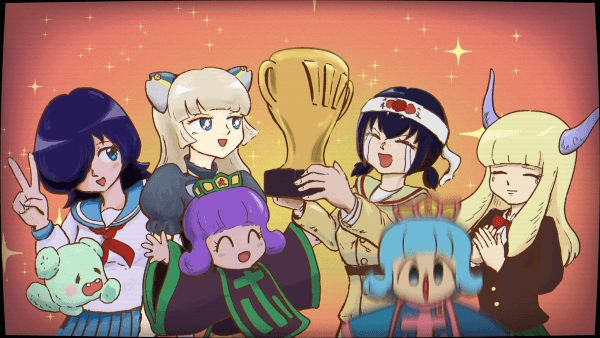🎮 ふりかけ☆スペイシー (Furikake Spacy)
2023年 4月 20日
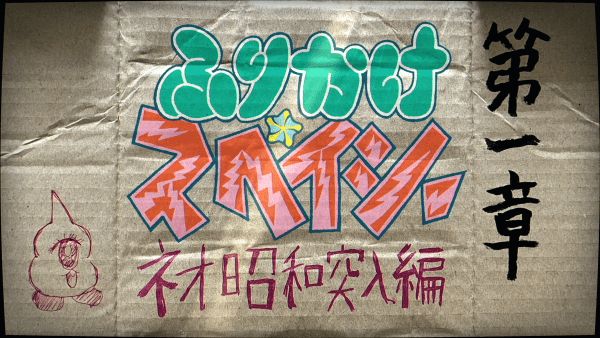
When friends get together to shoot the breeze, sometimes the conversation turns to the previous generations and how their music sucks, or their hairstyles were weird, and so on. Making jokes at how previous generations were so uncool is always going to be funny. And nothing is more irresistibly uncool than the media and aesthetics of the Showa Era, which lasted a whopping sixty-three years from 1926 to 1989. The Showa Era laid the bedrock for modern Japanese pop culture, spawning countless nostalgic touchstones that are often referenced even to this day.
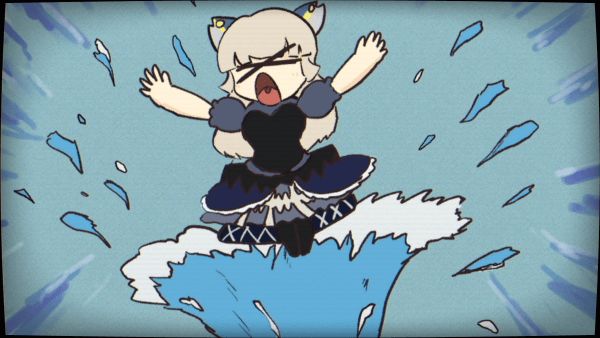
Meet Saatan, a goth-lolita from Shado-ga-Shima!
And it is with both love and derision for Showa Era trappings that you should enter Neo Showa, the bizarre setting of the comedic and absurd visual novel, ふりかけ☆スペイシー (Furikake Spacy) by よんとんトマチン (4ton Tomatine). I call it a visual novel, but it’s actually more like a high-octane gag anime in video game form. The comedy is an endless storm of quick jokes and visual gags skewering both Showa and modern society, and features a unique and bizarre cast of characters.
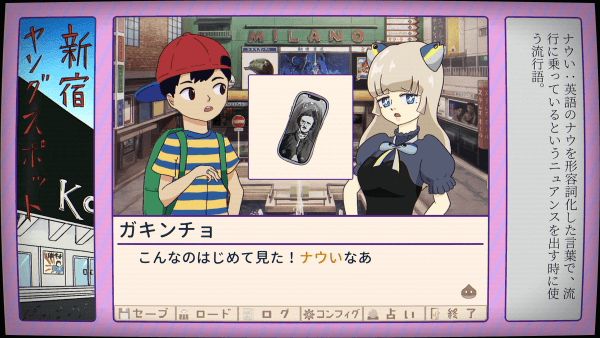
Gakincho: "This is my first time seeing something like this! It's very now-y."
The story follows Saatan, a goth-lolita who keeps failing her university entrance exams, as she wanders deeper and deeper into the strange world of Neo Showa. Even though the gameplay is largely restricted to clicking on the text to advance the story, the snappy tempo gives the jokes a quick rhythm similar to a TV comedy.
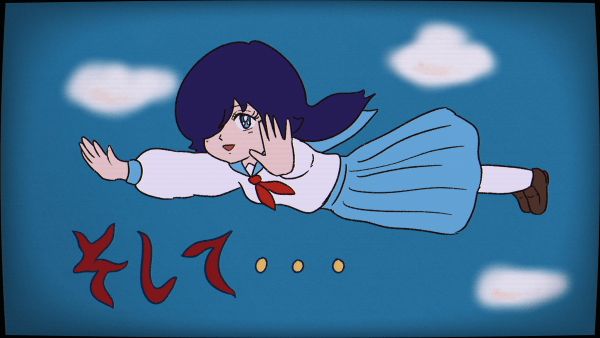
I wish I could be even half as carefree as Kagami.
The characters Saatan meets in Neo Showa are bizarre parodies referencing old characters and memes from the Showa Era. After encountering Kagami, a student at Furikake Gakuen, they encounter all manner of weirdos and bizarre situations. Kagami is so easygoing, yet has a tendency to pull Saatan down the weirdest paths. It’s hilarious watching those two interact.
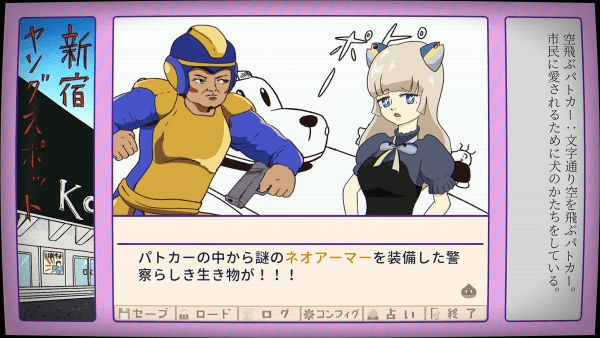
"From out of the police car stepped a puzzling officer-like creature wearing Neo Armor!!!"
The comedy does not only rely on nostalgic references. The sheer number of gags and the rapid-fire way characters dish them out is unlike any other visual novel I’ve ever played. There are some truly deep cuts in here, like the police officer modeled after the infamously bad Megaman US cover art, or the Electric Karate Club member who looks straight out of Karate Baka Ichidai twirling a stun gun. Welcome to Neo Showa!!
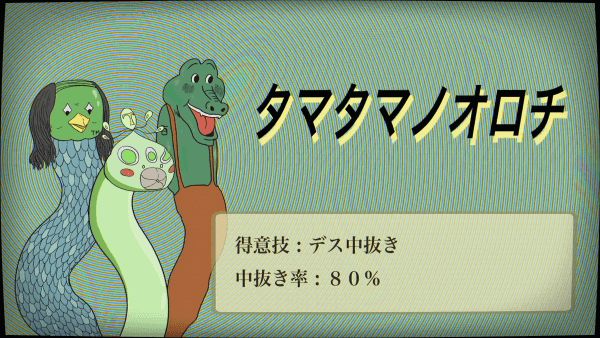
"Tamatama no Orochi. Special Attack: Middleman Getting Between Clients and Contractors to Claim the Lion's Share of the Funds of DEATH. Amount Claimed: 80%."
There are also episodes parodying modern societal issues. Trying to explain a joke robs it of its humor, so please forgive me for what I am about to do. To try and give you an idea of the layers to the gags, you need look no further than Odentsu, a three-headed Orochi that Saatan encounters in Hell, which is an obvious riff on the scandal-ridden Dentsu. One of its heads is the titular character from 100日後に死ぬワニ (Alligator That Will Die In 100 Days), a yonkoma series rumored to have been aggressively marketed from the shadows by Dentsu. Another head is an Amabie, a yokai that became popular during the pandemic because of its ability to end plagues, which Dentsu tried to trademark but was forced to withdraw due to intense backlash. There are so many details stacked on top of each visual and written gag, it’s like a twisted history book of modern life.
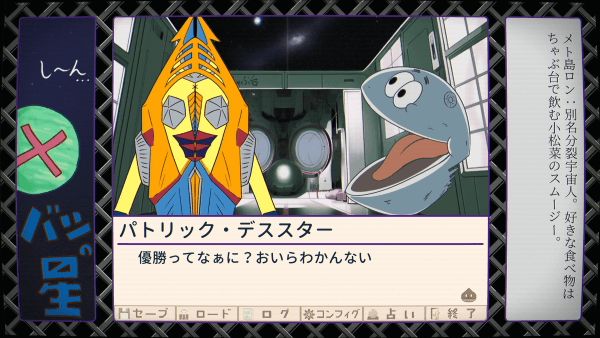
Patrick Deathstar: "What's 'victory'? No idea!"
Luckily, the game even includes a Neo Showa dictionary to help keep track of its many terms and references. The definitions are also a great sense of humor because they are, of course, themselves laden with further pop culture references. There is also a log that lets you review all of the dialogue up to that point, which you can access at any time. Reading the dictionary is not required to enjoy the story, but it would be a real loss if you were to skip all that wonderful context and additional humor.
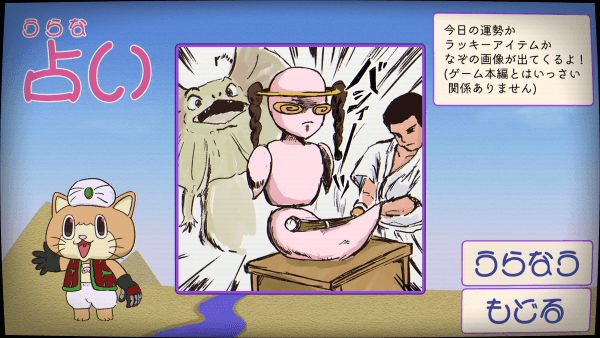
Does this mean I'm going to get good luck or bad luck?!
And at any point in the game, you can also access the fortune-telling corner, which takes the form of a gacha-like omikuji where you have a chance to pull some eccentric art or a photograph. Like the dictionary, this has absolutely nothing to do with the story. But the visual gags in these are very charming, and are a wonderful addition to the game.
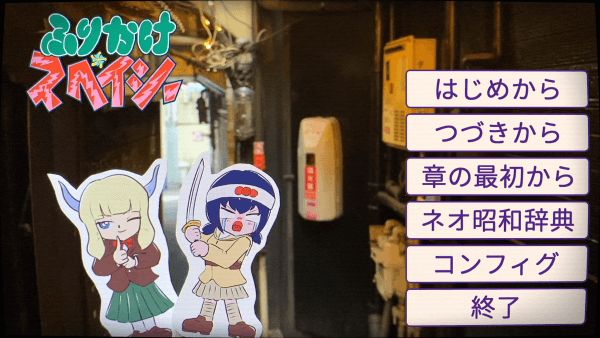
The title screen cycles between these short video clips of the Furikake Spacy characters crossing over to the real world. It's so great.
From the over-the-top visuals, the occasional video clips featuring real-world sightings of Neo Showa characters, and the Showa-flavored music that fills the game, it is clear that the people who made Furikake Spacy have a ton of love for this game.
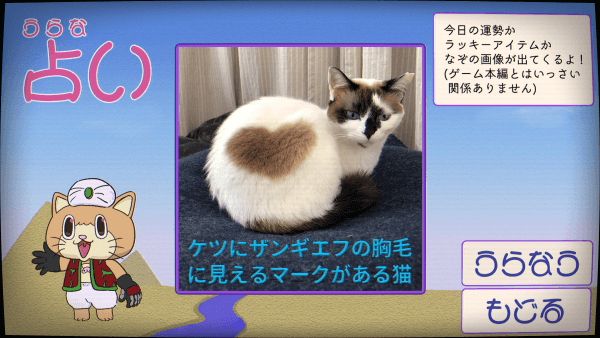
"A cat with a mark on its butt that looks like Zangief's chest hair."
To tell the truth, before I started playing, I thought I would have a few laughs at the nostalgic Showa Era references. But when I actually played the game, I realized there was so much more to it. On top of the nostalgic trappings, there is an unbelievable amount of absurdist humor that cracked me up from start to finish. The laughs I got from the sharp parodies of our modern world, mirrored back through the Neo Showa filter, was just the thing I needed. This game is just relentlessly funny.
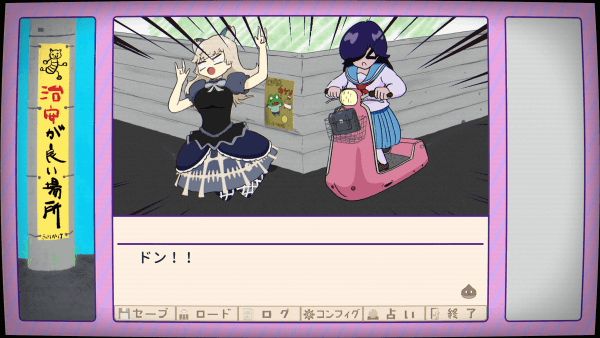
"BOOM!!"
It’s really difficult to put into words how much I laughed while playing this game. But I wanted to write this article because I am unmistakably happier now that I’ve played through Furikake Spacy.
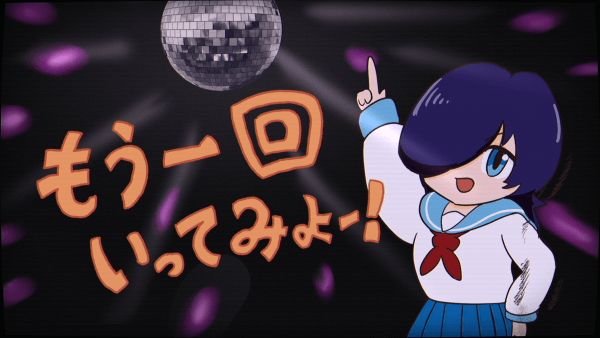
"Let's try one more time!"
You don’t need to know all of the Showa references. Of course, the jokes will land harder if you do, but even if they go over your head, there is still a lot more to the writing than just the references. If you have the chance, please play this game!
